Essential Tips You Can't Miss As A Tourist in Singapore
Singapore 101
Weather
Singapore has consistently hot and humid weather year-round, often with temperatures climbing above 30°C. While occasional heavy rainfall is common, it's usually brief. To stay prepared and dry, many locals opt to carry a portable umbrella with them to avoid getting caught in sudden showers.
Currency
The Singapore dollar notes come in denominations of S$2, S$5, S$10, S$50, S$100, S$1,000 and S$10,000. Coins come in 5, 10, 20 and 50 cents and S$1.
Where can I exchange currency?
Currency exchange services are available at banks, airports, certain hotels, and currency exchange booths in shopping malls and throughout the country.
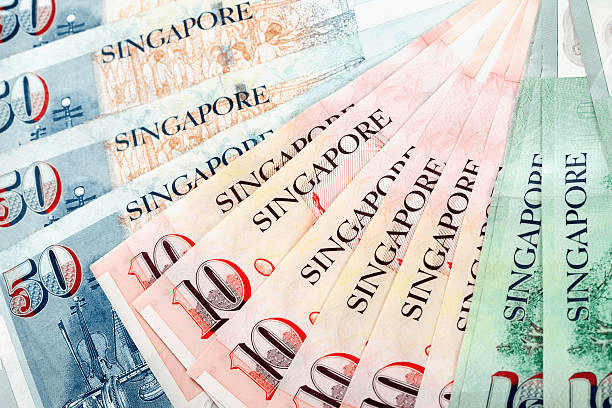
Power Plug
The standard electrical current used in Singapore is 220-240 volts AC (50 cycles) and you can use power plugs with three square prongs here.
The most commonly used power adapter for Singapore will be a Type G power adapter which allows you to use any 230 volt appliance or device.
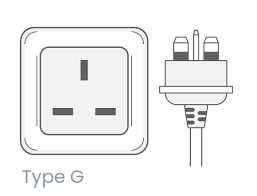
Language and Culture
Singapore is a multilingual society with four official languages: English, Mandarin Chinese, Malay, and Tamil. As such, you’ll hear different languages spoken on the MRT trains. You’ll be able to converse with most Singaporeans in English.
However, you might also encounter Singlish when mingling with the locals. Singlish is a blend of English with influences from various languages, including Malay, Chinese dialects, and Tamil. Short for “Singaporean English,” Singlish emerged as a product of Singapore’s unique historical and cultural development.
Here are some popular Singlish words:
- Lah - A versatile word used for emphasis or to soften a request or statement.
- Alamak - An expression of surprise, disappointment, or frustration.
- Shiok - Used to describe something enjoyable, satisfying, or excellent.
- Wah - An expression of admiration, surprise, or disbelief.
- Blur - Confused or unaware.
- Siao - Crazy or insane.
- Kiasu - Fear of missing out; competitive or overly eager.
- Bojio - An expression of disappointment when not invited or included in an activity.
- Chope - To reserve or save a seat or place.
- Lepak - To relax or hang out.
- Makan - To eat.
- Jalan-jalan - Go for a stroll or what.
- Paiseh - Embarrassed or ashamed.
- Steady - Good or impressive.
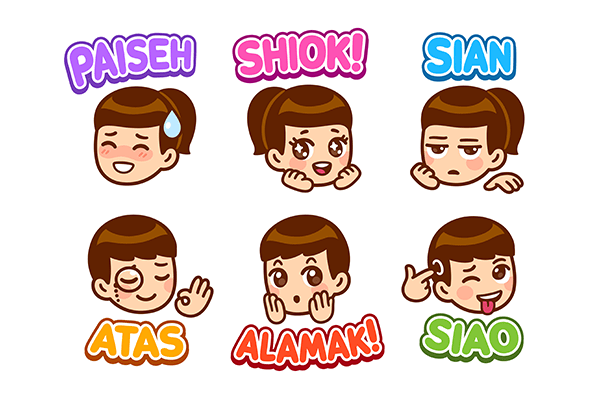
Etiquette
In Singapore, it is customary etiquette to stand on the left and walk on the right when using stairs or escalators. Hence, if you opt to ride up an escalator, it is recommended to position yourself on the left side, enabling those who wish to walk up to pass by smoothly on the right.
Chope Culture
The "chope" culture in Singapore refers to the practice of reserving seats or places at food centers, hawker centers, or other public spaces by placing personal items like tissue packets, umbrellas, or even name cards on a table. This informal reservation system is widely accepted and understood in Singaporean culture. "Chope" is a term derived from the Malay word for "reserve" or "save." It's a way for individuals to secure a seat or space before ordering food, especially during busy meal times when seating may be limited.
Tipping
Tipping is not expected in Singapore. If you’re eating out in a restaurant or cafe, there is usually a 10% service charge included in the bill. Some places may have a tip box but otherwise, additional tips are not mandatory or expected, though they are appreciated in the service line.
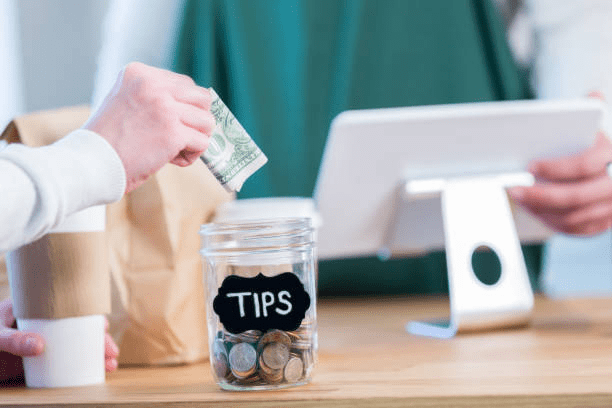
Useful Numbers
Police
999
Ambulance & Fire Brigade
995
Navigating Singapore
Wi-Fi & Connectivity
WiFi hotspots are widely available at various public areas and businesses across Singapore.
Free Public Wi-Fi
- Wireless@SGx
This is a free public Wi-Fi service across Singapore. You’ll find hotspots in malls, museums, MRT stations, public libraries and more.
Simply download the Wireless@SGx App from your app store, configure your mobile device and you’ll be automatically connected through your stay. The App not only shows you where Wi-Fi hotspots are, but also includes a speed test, diagnostics and feedback.
- Changi Airport
Free WiFi service is available in the public and transit areas of Changi Airport with #WiFi@Changi.
- Shopping Malls
Free WiFi service is offered at some shopping malls, restaurants and cafes in Singapore.
This service is usually displayed prominently for customers but do feel free to enquire directly at the malls’ information counters or with the servers for WiFi access.
5G Networks
Singapore has emerged as one of the pioneering nations to achieve comprehensive standalone 5G coverage, encompassing over 95% of its territory. For travelers visiting Singapore, accessing high-speed downloads is now possible with 5G prepaid SIM cards, like the Hi!Tourist 5G Sim Cards provided by Singtel.
Since 2017, 2G network services have ceased in Singapore. Therefore, it is advisable for you to bring along a mobile device equipped with 3G or 4G capabilities when traveling to the country.
In case your current mobile operator does not offer 3G or 4G roaming services, it's recommended to purchase a prepaid SIM card upon arrival to ensure instant connectivity.
Pocket Wi-Fi
You have the option to link multiple devices to the internet using a pocket WiFi device. This portable hotspot offers access to data across the entire island for your laptop, tablet, and/or smartphone. This is a suitable choice if you have several devices, require WiFi connectivity, and don't plan to make many calls.
Pocket WiFi devices are rentable at Changi Recommends counters located at Singapore Changi Airport. You can conveniently return the devices at these counters just before your departure flight.
Sim Card
Tourists visiting Singapore can purchase SIM cards from various locations, including:
- Changi Airport:
Changi Airport: SIM cards are available for purchase at convenience stores like Cheers or 7-Eleven, as well as at specific booths in the arrival halls of each terminal.
- Local Telco Stores:
Visit stores of major telecommunication companies such as Singtel, StarHub, and M1, which are located throughout Singapore, including malls and shopping centers.
- Retailers and Convenience Stores:
SIM cards are also sold at various retail outlets and convenience stores across the city, including electronics stores, supermarkets, and pharmacies.
- Tourist Information Centers:
Some tourist information centers may offer SIM cards for purchase or provide guidance on where to buy them.
It's advisable to compare prices and data plans offered by different providers to choose the best option based on your needs and budget. Additionally, ensure that your device is unlocked and compatible with the local network frequencies before purchasing a SIM card.

Getting Around Singapore
By Public Transport
Singapore’s MRT (Mass Rapid Transit) and bus systems have an extensive network of routes that will go from one place to another. Most of our popular attractions are just a short walk away from an MRT station, making our trains a great way to get around.
-
Get a Singapore Tourist Pass (STP), a special EZ-Link stored-value card which will allow you unlimited travel for one, two or three days.
The Pass can be bought at the SimplyGo Ticket Office at selected MRT stations listed here.
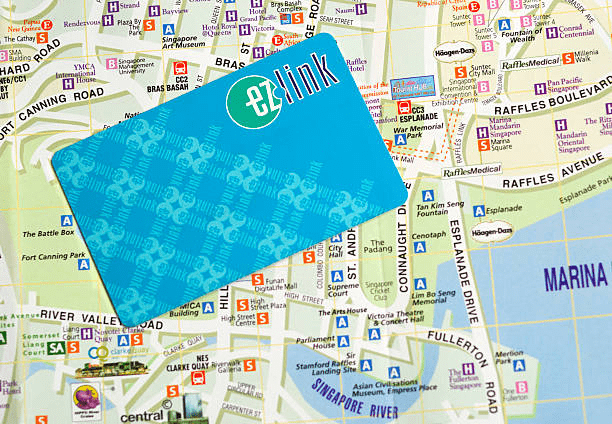
-
Adult Stored-Value Smartcard (EZ-Link / NETS FlashPay): These cost $10 and come with a stored value of $5 for you to use on your commutes. You’ll be able to purchase these at Passenger Service Centres in train stations, any SimplyGo Ticket Office or convenience stores such as 7-11, Buzz and Cheers.
-
You can use your foreign-issued Mastercard® and Visa contactless bank cards2, as well as your mobile wallets for the payment of public transport fares in Singapore. No registration is required.
2Admin fees apply for foreign-issued bank cards.
-
Children above 0.9m in height and below 7 years old can apply for a Child Concession Card at SimplyGo Ticket Office to travel for free on basic bus and train services.
Children below 0.9m in height accompanied by a fare-paying commuter can automatically travel for free. For more information on Child Concession Cards, please visit SimplyGo website.
By taxi or ride-hailing apps
Taxis offer comfort and are particularly useful for reaching destinations inaccessible by bus or MRT. Taxis in Singapore operate on meters, although there may be additional charges depending on factors such as time, location, and taxi company.
You can hail a taxi by the roadside at most places, or by queuing for one at a taxi stand, which you’ll find at most malls, hotels and attractions.
Alternatively, you may use one of the ride-hailing applications available in Singapore to book a ride from your preferred pick-up point to your desired destination. Some options available include Grab, Gojek, Ryde and TADA.
Rules & Regulations
Tax Refund
As a tourist in Singapore, if you spend over S$100 (inclusive of GST) at eligible stores, you can request a refund on the 9% Goods and Services Tax (GST) paid. This initiative is referred to as the Tourism Refund scheme. Make sure to verify if a store is part of the Tourism Refund Scheme by spotting the "Tax Free" shopping logo or sign displayed at the establishment.
Which of my purchases are ineligible for a GST refund?
- Goods which you have already used or consumed in Singapore.
- Goods that you are exporting for commercial purposes.
- Goods that will be exported by freight.
- Accommodation in a hotel or hostel, and services such as car rental and tour charges.
How do I get a tax refund in Singapore?
You can get a tax refund via the Electronic Tourist Refund (eTRS) self-help kiosks at Changi Airport.
Apply for your GST refund using the eTRS self-help kiosks at Changi Airport Departure Check-in Hall (before departure immigration)1 and Departure Transit Lounge (after departure immigration)2; and at Seletar Airport Immigration & Checkpoints Authority (ICA) duty office.
You'll want to arrive at the airport early to allow sufficient time to process your GST refund and for the inspection of goods (if required).
Scan your passport at the kiosk to retrieve details of all your purchases. Follow the instructions on the eTRS self-help kiosk thereafter to apply for your GST refund.
When you are done, read carefully the outcome of your refund request shown on the kiosk to confirm if you would need to go to the Customs Inspection counter to have your purchases verified.
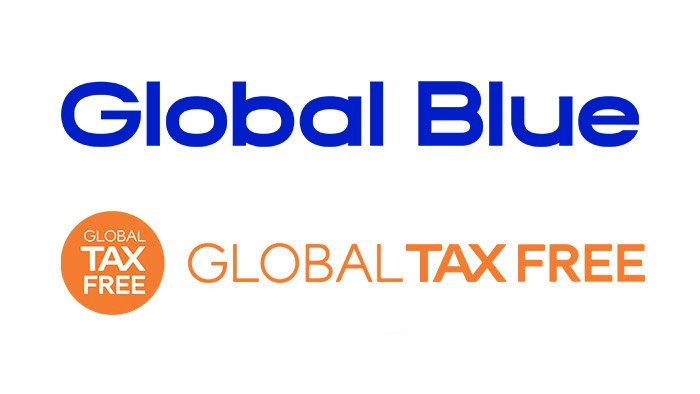
Smoking and Vaping
No Smoking Areas
Smoking is prohibited in the places such as (non-exhaustive):
- Recreational facilities such as cinemas, public swimming pools, clubs, sports hubs and community centres
- Anywhere within 5 metres of educational facilities such as schools and universities
- Reservoirs
- Government and statutory bodies’ buildings
- Bus stop shelters and anywhere within a 5-metre radius of bus stop shelters
- MRT stations
- Hotel and lift lobbies
- Hawker centres
- Overhead bridges
- Void deck and stairwells
- Airports and ferry terminals
- Hospitals
- Covered drop-off and pick up point for passengers
- Carparks
- Public parks and gardens, and 10 recreational beaches (prohibited from 1 July 2022 onwards, with enforcement action to be taken from 1 October 2022. View the list of beaches where smoking is prohibited here)
- Any area that is 5 metres of ventilation intakes or external windows or openings
- Any public service vehicle such as buses, private-hire cars and taxis
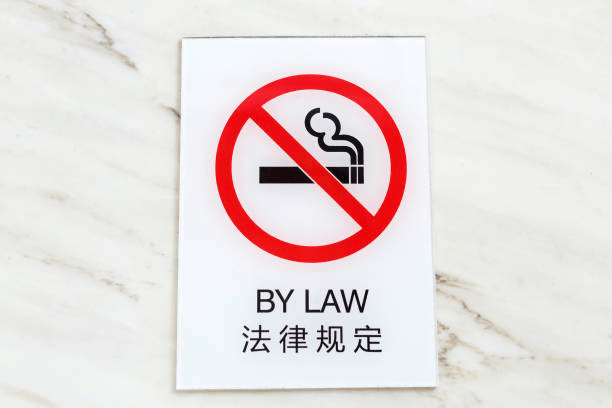
No smoking in Orchard Road
The Orchard Road area is also a smoke-free zone. People who wish to smoke in Orchard Road are allowed to do so only within Designated Smoking Areas (DSAs).
Fine for Smoking in Singapore at Restricted Places
- One can be fined a minimum of 200 SGD (Singaporean Dollars)
- If held guilty in court, the fine can be of up to 1000 SGD. The concerned premise is fined 200 SGD for the 1st time around and 500 SGD thereafter.
- There is a fine on cigarette butt littering as well
What is the Legal Age for Smoking in Singapore?
As of 1 January 2021, the minimum age for smoking in Singapore is 21 years old. Underage smokers caught smoking can be fined up to $300.
Vaping Rules
It is illegal to possess, purchase or use e-cigarettes, e-pipes and e-cigars in Singapore. While smoking e-cigarettes, e-pipes, or e-cigars can lead up to a fine of SGD 2,000, importing, buying online or shipping it, which has been illegal since 2016, can result in fine up to SGD 10,000 or 6 months in jail, with a subsequent charge being a fine up to SGD 20,000 or 12 months in jail.
Duty-Free Regulations
Singapore's duty-free regulations, particularly concerning cigarettes, are stringent. It's crucial to note that there are no exemptions for tobacco regardless of its origin. If you've purchased a carton of cigarettes at your departure point or during your flight, be prepared to pay taxes upon arrival.
In contrast, regulations for alcohol are less strict. Travelers are allowed to bring in up to two liters of alcohol in various combinations. For instance, this could include 1 liter of wine and 1 liter of beer, or vice versa. Alternatively, travelers could bring 1 liter of spirits and 1 liter of beer or wine. Another option is to bring 2 liters of wine.
Needless to say, narcotics of any form are prohibited, including soft drugs and marijuana. Don’t even think about it.
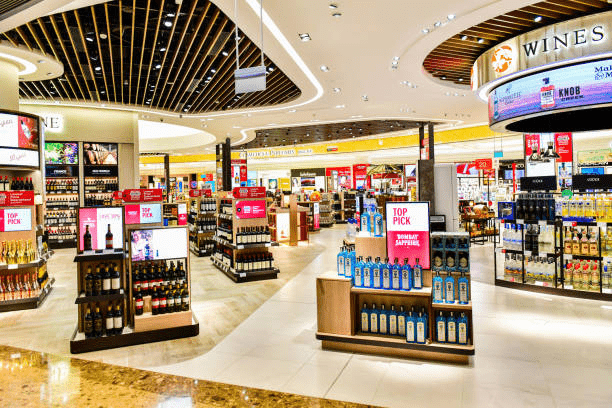
Alcohol Consumption
In Singapore, the legal drinking age is 18 years old. Consuming alcohol in public spaces, including parks, beaches, and streets, is prohibited by law. Being intoxicated in public places can result in severe repercussions.
Alcohol consumption is prohibited in all public areas from 10:30 pm to 7 am, and retail outlets are not allowed to sell takeaway alcohol during these hours as well. It's important to note that this restriction does not apply to licensed pubs.
In the Geylang and Little India precincts, stricter regulations are enforced. Public drinking is banned from 7 am on Saturdays to 7 am on Mondays, and from 7 pm on the eve of a public holiday to 7 am on the day after the holiday. Retail outlets in these areas are prohibited from selling takeaway alcohol from 7 pm onwards on weekends.
While these laws may seem stringent, they simply mean that alcohol consumption is permitted only at licensed establishments during the specified hours.
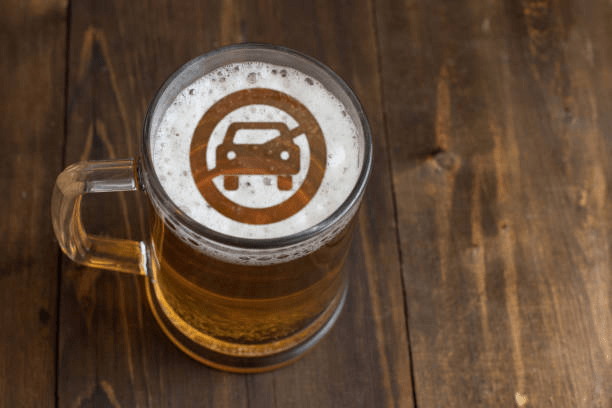
Drink driving and alcohol limits in Singapore
Singapore's legal drink-driving limit is strictly enforced at 80 milligrams per 100ml of blood, or 0.08% blood alcohol content.
If your breath alcohol content is more than 35 micrograms of alcohol per 100ml of breath, or you are under the limit but appear to be out of control in your vehicle, you can still be criminally charged.
Littering
Singapore is famous for its cleanliness, and it's widely known that littering is a serious offense. Even small items such as cigarette butts can lead to fines, while larger pieces of litter may incur even more severe penalties. Under the Environmental Public Health Act, any individual committing a littering offence is liable to a Court fine of up to $2,000 for a first conviction, $4,000 for a second conviction and $10,000 for subsequent convictions.
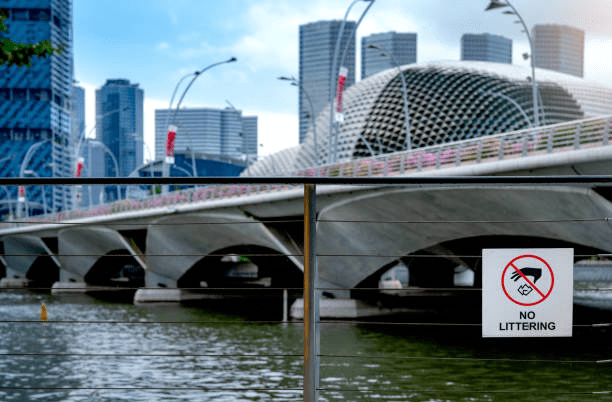
Chewing Gum
The chewing gum law in Singapore, enacted in 1992, prohibits the import, sale, and possession of chewing gum except for therapeutic, dental, or nicotine gum with a prescription. The ban aims to maintain cleanliness, public order, and hygiene due to issues like littering, vandalism, and safety hazards associated with chewing gum. Strict enforcement includes fines and imprisonment for offenders.
The Singapore Government levied heavy fines of USD 100,000 or a prison sentence of up to two years against those who were found selling it. The Singapore chewing gum penalty is very similar to the littering fines, where you get fined USD 500 – USD 1000 on the first offence, and USD 2000 for the repeat offenders.
It has always been legal to bring small amounts into the country for one’s own use. Besides, not all gums are illegal in Singapore: Since 2004 – as a result of the US-Singapore Free Trade Agreement – pharmacists and dentists have also been allowed to sell “therapeutic” gum, to customers with a medical prescription. This includes standard sugar-free gum.
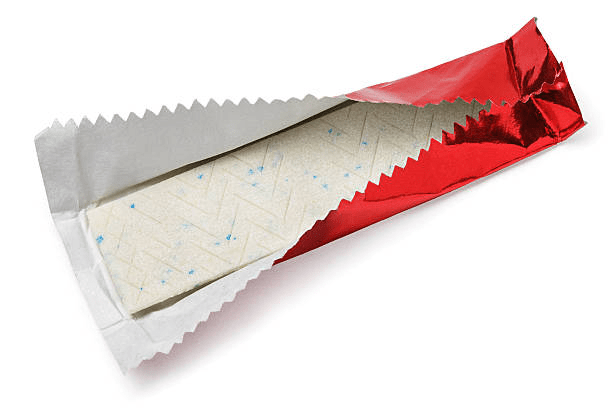
Food & Fun
Must-visit Attractions
Some of the must-visit popular tourist attractions in Singapore include Gardens by the Bay, Sentosa Island, Studios Singapore, and the Singapore Zoo.
You can seamlessly book your attraction tickets through the GoSingapore platform.
Pre-book your tickets to avoid the long queue and skip the line.
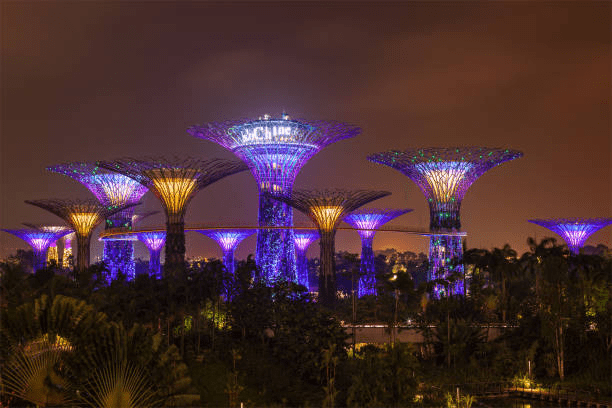
Must-Try Food
Food plays a crucial role in Singaporean culture, and to truly immerse yourself in the local way of life, explore the renowned hawker centers where you can savor beloved dishes enjoyed by locals. Don't miss out on iconic Singaporean delights such as Hainanese chicken rice, chili crab, laksa, kaya toast, char kway teow, hokkien mee, bak kut teh, and nasi lemak for an authentic culinary experience.
When dining at hawker centres, coffee shops and food courts, remember to clear your table and return your trays and crockery at the tray return booths once you’re done with your food. Those who do not comply and are first-time offenders will be issued written warnings. Second-time offenders will face a composition fine of S$300, while subsequent offenders may face court fines.
Check out the F&B deals available on the GoSingapore platform.
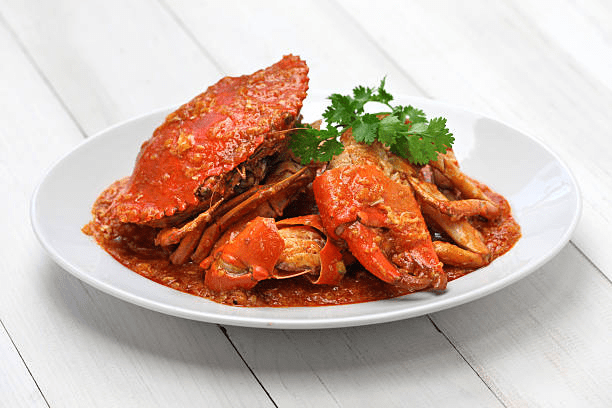
Durian Consumption
Though it's not illegal, eating durian is banned in many public spaces, and carrying it is prohibited on public transport because of its smell. If you insist on taking with you on board the MRT, you’ll face a fine of up to $500.
Many hotels also forbid the consumption of durians in their rooms because of its strong pungent smell. Therefore, it's best to avoid trying to sneak in this famously fragrant fruit.
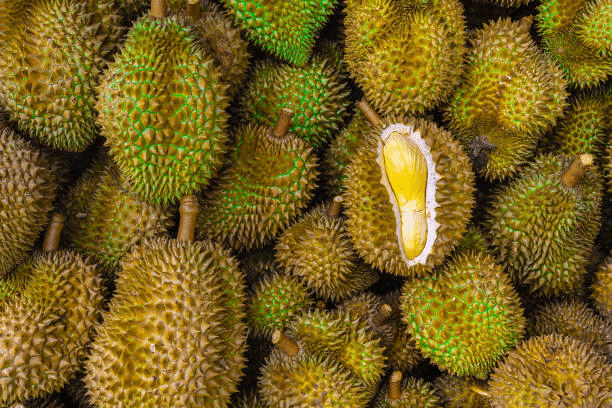
Tap Water
You can drink water straight from the tap as the water in Singapore passes World Health Organization standards. You can also buy bottled water easily from most convenience stores and eateries.

Drinking and Eating On Public Transport
Unfortunately, consuming food or beverages is prohibited on the MRT trains or within the stations. The 1987 Rapid Transit Systems (RTS) Act, enacted by Parliament, strictly prohibits this practice. Violators risk receiving an offense notification, potentially incurring a fine of up to $500. Even drinking plain water, or any beverage for that matter, is not permitted because the beverage could spill and wet seats, soil other commuters’ belongings or cause a fellow commuter to slip and fall.



